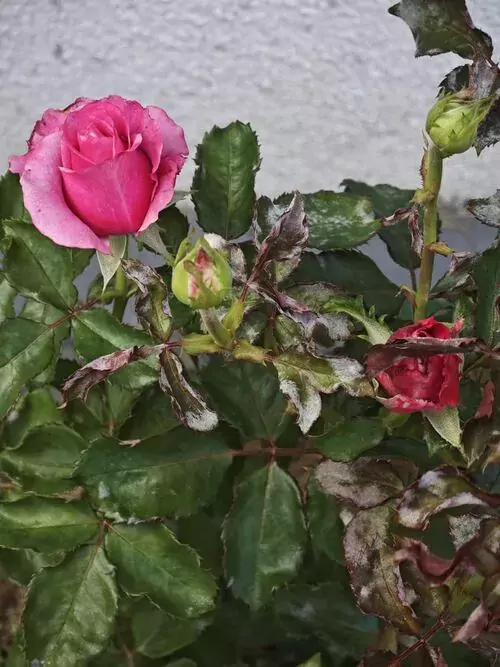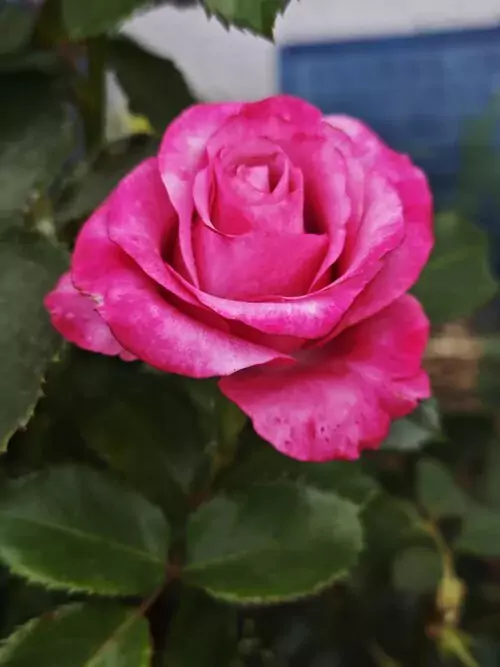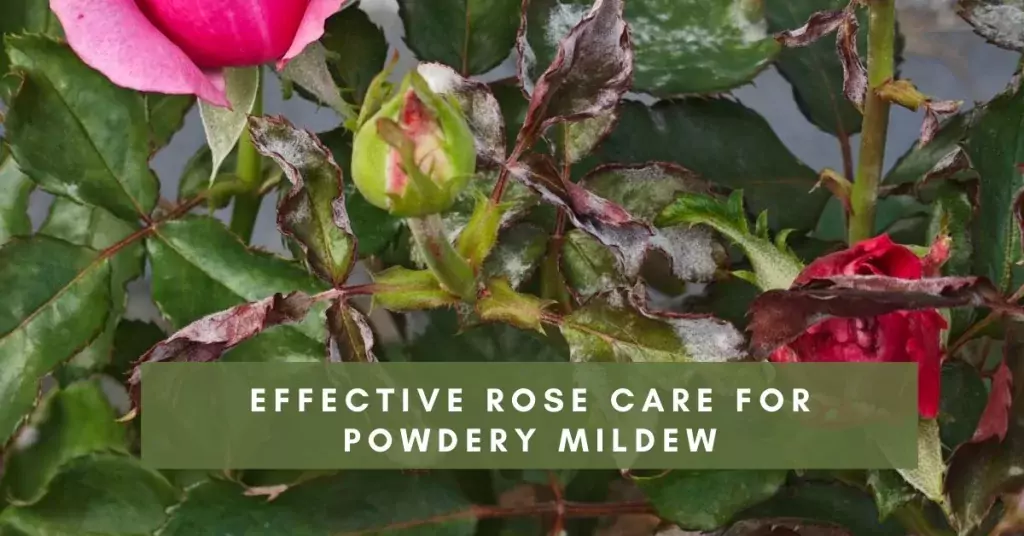There’s something genuinely magical about stepping into a garden filled with the delicate beauty of roses. As I wander through my cottage garden, I can’t help but be captivated by the soft, pastel blooms and the sweet fragrance that fills the air. But as much as we adore these beautiful flowers, they are not without their challenges. One of the most common and frustrating issues every rose gardener faces is powdery mildew. This pesky fungal disease can quickly mar the beauty of your rose garden, but with some knowledge and tried-and-true methods, you can keep your roses healthy and thriving. Let me share my journey of battling powdery mildew and how you can protect your roses from this familiar garden foe.
What Is Powdery Mildew?
Powdery mildew is a fungal disease that often affects roses, covering their leaves, buds, and stems with a white or gray powdery coating. Unlike other plant diseases, powdery mildew doesn’t require moisture to spread, making it a persistent problem in various climates. This disease can weaken your roses over time, stunting their growth and reducing their ability to produce those gorgeous blooms we all love.
Early symptoms include a powdery white coating on leaves, which can be easily wiped off initially. As the infection progresses, leaves become distorted, leading to stunted growth and small, lackluster blooms. In severe cases, leaves might turn red and fall off, leaving the plant vulnerable.

Powdery Mildew vs. downy mildew
It’s important to distinguish between actual powdery mildew and its lesser-known cousin, downy mildew, as the treatment methods differ. Powdery mildew is characterized by a bright white, powdery layer that primarily affects the upper parts of the leaves, buds, and stems. Over time, the leaves may turn yellow, curl, and dry out, but they rarely fall off. This mildew thrives in dry conditions with poor air circulation and usually appears when the roses are planted too closely together.
On the other hand, downy mildew presents with yellowish or light brown spots on the upper side of the leaves and gray mold on the underside. Unlike mildew, the affected leaves don’t dry out but turn black and fall off. Downy mildew typically emerges after periods of unstable weather with significant temperature fluctuations, such as hot days followed by chilly nights. Excessive moisture and waterlogged soil can also contribute to its development.
Prevention: The First Line of Defense
Preventing powdery mildew on roses starts with good garden hygiene and proper care. Here are some essential tips to keep your roses healthy:
- Proper Spacing: Ensure your rose bushes are spaced adequately to promote good air circulation. Crowded plants create a humid environment where powdery mildew can thrive.
- Watering Techniques: Water your roses at the base to keep the foliage dry. Wet leaves create an ideal environment for mildew spores to germinate.
- Pruning: Regularly prune your roses to remove dead or diseased leaves and branches. This not only helps prevent mildew but also encourages healthy growth and blooming.
- Soil Health: Maintain well-drained soil to avoid waterlogging, which can lead to false powdery mildew.
Powdery Mildew Treatment: Taking Action
When powdery mildew strikes, swift action is crucial; the good news is that you don’t always need harsh chemicals to combat it. If the infection is mild and your plants are generally healthy, consider letting nature take its course while focusing on prevention.
For those keen on intervention, natural remedies can be surprisingly effective. A milk spray that mixes one part of the milk with ten amounts of water works wonders. The lactic acid bacteria in milk combat this fungal disease effectively. Ensure thorough coverage, drenching the leaves and stems. Alternatively, neem oil, a natural pesticide, can halt the fungus. Its organic nature makes it a safe choice for your precious roses.
For more advanced cases, mineral oil-based products like Monterey Complete Disease Control can be your knight in shining armor. These products, containing beneficial bacteria, act as formidable foes against the powdery mildew menace. Please be sure to follow the manufacturer’s instructions diligently to make sure you get the best results.
Home Remedies for Mildew on Roses: Kitchen Magic
There’s no need to panic if you spot the telltale signs of powdery mildew on your roses. Many gardeners, including myself, prefer to start with natural remedies before resorting to chemical treatments. Here are some of the most effective home remedies:
- Wood Ash Solution: Mix 200 grams of wood ash in 5 liters of warm water and let it sit for 4-5 days, stirring occasionally. Strain the mixture, add a tablespoon of soap flakes, and spray it on the affected roses every two days for a maximum of three treatments. This solution helps treat mildew and provides essential potassium to the plants.
- Baking Soda Spray: Dissolve 10 grams of baking soda in 2 liters of hot water, then add a teaspoon of liquid soap. Allow the solution to cool before spraying it on the roses. Repeat every 6-8 days, with 2-3 applications. Baking soda alters the pH of the leaves, making it difficult for mildew to survive.
- Milk Mixture: Dilute milk with water at a ratio of 1:10 and spray it on the roses at the first sign of mildew. Milk contains proteins that produce free radicals when exposed to sunlight, which helps kill the mildew spores.
- Garlic Infusion: Crush 25 grams of garlic and soak it in 1 liter of water daily. Strain the liquid and spray it directly onto the infected areas. Garlic contains natural antifungal properties that help combat mildew.
Other Treatments: Biological Alternatives
Biological solutions can save the day for gardeners who are short on time or dealing with severe infections. Equisetum Plus, primarily composed of standard horsetail extract, offers an effective treatment. Various sulfur-based products can combat fungi correctly without harming beneficial insects. Copper-based fungicides, while organic, should be used cautiously to avoid harmful concentrations over time.
When Natural Remedies Aren't Enough
While natural remedies are often practical, severe cases of powdery mildew may require chemical fungicides. It’s essential to select a fungicide that is safe for roses and follow the manufacturer’s instructions carefully. Look for sulfur, potassium bicarbonate, or myclobutanil products, as these effectively control powdery mildew. Always apply fungicides early in the morning or late evening to prevent leaf burns and ensure the best results.
Defend Your Roses, Reclaim Your Garden
this fungal disease might be a persistent foe, but armed with knowledge and strategies; you can protect your roses and ensure a blooming paradise. Remember, prevention is your best friend, but natural and home remedies and carefully chosen products can turn the tide in your favor when the enemy strikes.
Administer antifungal treatments to your roses preventively every two weeks. Treat the plants beforehand if extended rainfall is predicted in the weather forecast. Rainy periods significantly elevate the risk of fungal diseases on roses.
So, fellow rose enthusiasts, don’t let powdery mildew dampen your gardening spirit. With this guide, venture into your garden, ready to defend your roses and reclaim your blooming paradise.
Happy gardening!


Get Your Free Lunar Gardener's Calendar 2024!
Join the Lunar Gardening Revolution! Subscribe now to receive our exclusive Free Lunar Gardener’s Calendar for 2024. Harness the power of the moon to optimize your planting, nurturing, and harvesting.
FAQs
What is the best method for controlling powdery mildew?
Controlling powdery mildew involves a combination of preventive measures and treatments. Proper pruning, good air circulation, and fungicidal solutions like neem oil or potassium bicarbonate can effectively control the disease.
What kills powdery mildew on plants?
Various treatments like neem oil, milk sprays, or baking soda solutions can effectively kill powdery plant mildew. These solutions disrupt the fungal growth and prevent further spread.
Why do roses get powdery mildew?
Roses are susceptible to powdery mildew due to specific environmental conditions such as hot days, cool nights, and high humidity. The fungus thrives in these conditions, leading to the development of powdery mildew on rose plants.
Can a plant survive powdery mildew?
Plants can survive powdery mildew if the disease is detected early and appropriate treatments are applied. Regular pruning, proper watering, and fungicidal treatments can help the plant recover and grow.
Can plants recover from powdery mildew?
With timely and appropriate treatments, plants can recover from powdery mildew. Pruning affected parts, ensuring proper air circulation, and using antifungal agents can aid in the plant’s recovery and prevent future infections.
Recent Posts

The Organic Rose Revolution: Grow Stunning Blooms, Naturally
- Unlock the secrets of nurturing your roses organically with our guidance on soil health, natural fertilizers, and sustainable pest control methods. Your garden will thrive with eco-friendly care that respects nature’s balance.
- Empower yourself with the knowledge to craft natural remedies for common rose ailments.
- Banish pests from your garden precisely using proven strategies that safeguard your roses without harsh chemicals. Keep aphids, mites, and other invaders at bay while preserving your garden’s natural harmony.
- Explore a world of breathtaking rose varieties carefully curated to captivate your senses and elevate your garden to new heights of beauty.

The Organic Rose Revolution: Grow Stunning Blooms, Naturally
- Unlock the secrets of nurturing your roses organically with our guidance on soil health, natural fertilizers, and sustainable pest control methods. Your garden will thrive with eco-friendly care that respects nature’s balance.
- Empower yourself with the knowledge to craft natural remedies for common rose ailments.
- Banish pests from your garden precisely using proven strategies that safeguard your roses without harsh chemicals. Keep aphids, mites, and other invaders at bay while preserving your garden’s natural harmony.
- Explore a world of breathtaking rose varieties carefully curated to captivate your senses and elevate your garden to new heights of beauty.

The Organic Rose Revolution: Grow Stunning Blooms, Naturally
- Unlock the secrets of nurturing your roses organically with our guidance on soil health, natural fertilizers, and sustainable pest control methods. Your garden will thrive with eco-friendly care that respects nature’s balance.
- Empower yourself with the knowledge to craft natural remedies for common rose ailments.
- Banish pests from your garden precisely using proven strategies that safeguard your roses without harsh chemicals. Keep aphids, mites, and other invaders at bay while preserving your garden’s natural harmony.
- Explore a world of breathtaking rose varieties carefully curated to captivate your senses and elevate your garden to new heights of beauty.

